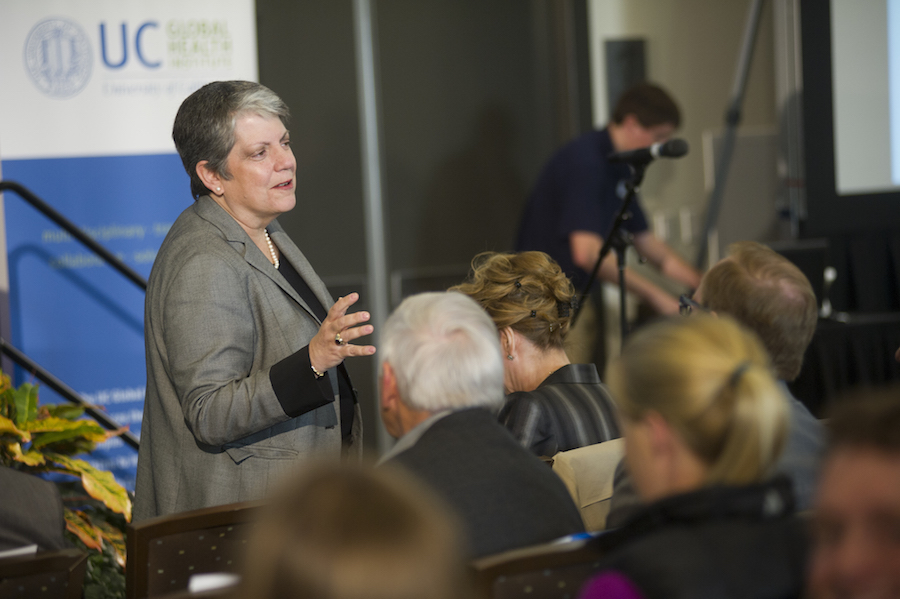
UC President Napolitano, Mexican Secretary of Energy Joaquin continue partnership
University of California (UC) President Janet Napolitano met with Mexican Secretary of Energy Pedro Joaquín Coldwell in Mexico City on March 30 to announce the $10 million raised for energy efficiency projects. These projects will be jointly led between Mexican research institutes and UC researchers. According to Napolitano, these projects are a way of bolstering a partnership between the nations through reaching shared energy goals and combating climate change.
The UC-Mexico initiative was first launched in 2014, creating academic UC programs in Mexico and coordinating student and researcher exchanges between the two countries, as well as to foster answers to shared problems like pollution and climate change. On March 30, Joaquin officially solidified the proposal requests for $10 million U.S. dollars from the Mexican Ministry of Energy SENER-CONACYT Energy Sustainability Fund (FSE) to fund Mexico’s clean energy projects. UC researchers will actively participate in the research.
This initiative and funded project confront a new presidential administration which has called global warming “a hoax”, proposed ending the Environmental Protection Agency (EPA) and removed the climate change data from the EPA’s website.
Napolitano, however, has long been an advocate for clean energy, creating a goal of UC-wide carbon neutrality by 2025 through the UC Carbon Neutrality Initiative, established in 2013. Since 2013, the UC system has saved an estimated $28 million in energy costs.
Napolitano made clear that regardless of executive decisions to restrict physical or academic access between Mexico and the United States, the UC-Mexico initiative will continue.
“Regardless of what is happening federally, the University of California remains open to academic partnerships with Mexico,” Napolitano said to the Los Angeles Times on March 22.
Stephanie Beechem, a member of media relations for the UC Office of the President, relayed the same message of scientific, academic and social cooperation between UC and Mexico.
“UC believes that it is critically important to maintain a robust and enduring relationship with Mexico through student and faculty exchanges, the celebration of our shared heritage and populations, and research and scholarly activity that solves problems and advances shared knowledge,” Beechem said via email.
Beechem reiterated Napolitano’s assurance that the initiative between the two countries will continue.
“The UC-Mexico initiative will continue to focus on key areas of interest to both California and Mexico, as well as the United States,” Beechem said. “Energy, environment, education, health, arts and culture.”
The initiative was started by UC Riverside, but is a UC-wide program. According to the UC-Mexico Initiative website, the initiative aims to identify shared problems and catalyze shared solutions.
“Led by the University of California Riverside, the UC-Mexico Initiative brings together scholars and leaders from the University of California with those from distinguished sister institutions in Mexico to consider innovative ways to broaden and deepen our connections for the benefit of all,” the website read. “The goal of the UC-Mexico Initiative is to identify shared problems, bring shared resources and effort to bear toward a shared solution and to share in the impact that those efforts produce.”
Beechem spoke of UC Davis’ role in the initiative and how UC Davis provided academic fodder through workshops and other mediums.
“UC Davis faculty and researchers have been actively involved in President Napolitano’s UC-Mexico initiative, including playing a significant role in the Energy Working Group,” Beechem said. ”The UC Davis Office of Research and the Energy Efficiency Center hosted a workshop on Energy Efficiency Collaborations on the Davis campus in March 2016, which involved over a dozen Mexican institutions and researchers from across UC and the national labs.”
Kimberly Hale, the interim director of News and Media Relations for UC Davis, said via email that “the university [Davis] supports President Napolitano’s vision and efforts.”
UC Davis and other UC researchers’ involvement in the UC-Mexico initiative can be found in the UC-Mexico faculty registry.
In a UC press release, Joaquin highlighted his support of the UC-Mexico initiative.
“The promotion of science and the development of talent and human capital is key for the transformation and modernization of Mexico’s energy sector,” Joaquin said. “I want to reiterate my appreciation and recognition of President Janet Napolitano for her leadership and contribution to the prosperity of the North American region. Her work is having a significant contribution to the formation of specialized human capital and in the field of clean energy in California and Mexico.”
Thomas Jara, a first-year biotechnology major, voiced concern over Trump’s lack of alignment with Napolitano’s clean-energy ventures, criticizing Trump’s counter-actions and continual fossil-fuel support.
“Trump has been rude to a lot of allies — especially Mexico,” Jara said. “Oil is finite — it’s a finite thing. We’re going to run out of it. It is not cost-effective or sane to invest so much in oil. It doesn’t make any sense that Trump’s doing that and with his EPA actions, he shows no evidence of anything and it makes no sense why he’s cutting down on these regulations.”
Written by: Aaron Liss — campus@theaggie.org



